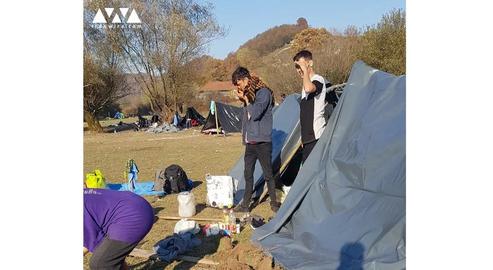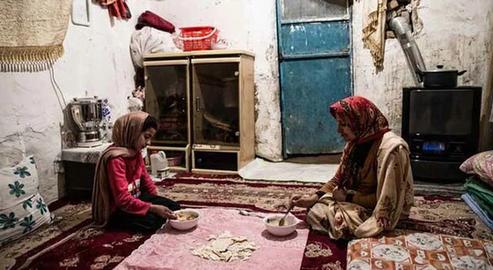In the shadow-world of asylum seekers, the term "game" has a specific meaning. In most cases it connotes clandestine night-time activity, operating under cover of darkness while trying to cross heavily-guarded borders into often hostile destination countries. Those who manage to cross are deemed to have won the game. The losers are those who are caught and forcibly returned, often with battered bodies and empty wallets. To put one’s life in the hands of a trafficker is a game. Sometimes, the cost of taking part is death.
This report recounts an eyewitness testimony from such gaming arena on the Bosnian-Croatian border. The players are Persian and Dari speakers from Afghanistan and Iran, who have been waiting for a long time for their throw of the dice. The aim is Croatia, the gateway to the European Union.
***
"We really should all be ashamed of ourselves.
“These people are in a permanent state of terror. They’re afraid a calamity might befall them at any moment. In these conditions, they’ll take any chance they get to flee to Croatia, but they get arrested and beaten, and their belongings are confiscated. These people are the living proof of how Europe treats asylum seekers.”
Behrouz Asadi, a political activist and advocate for refugees, recently made his way to Bosnia and Herzegovina to see for himself how new arrivals were being treated at the onset of winter. Would-be asylum seekers often take the so-called Balkan route from Turkey, Bulgaria, and sometimes northern Greece in a bid to get into western Europe. Their path passes through forests, mountains and plains, and though the sun might be shining during the day, it’s now bitterly cold and they may have to endure heavy snow and storms.
The European Union has long provided funding for Croatia to deal with the influx of asylum seekers from all over the world. Under the EU’s Dublin Agreement, new arrivals must apply for asylum in the first “safe country” they come to, and Croatia is obligated to process them. But what happens practice is often different, and the country’s border guards have gained a reputation for violent, illegal pushbacks.
There have been scores of reports of violent clashes between Croatian border guards and asylum seekers. Hidden cameras set up by human rights groups about seven years ago caught a string of such incidents on film, in the forests on the Bosnian-Croatian border. Patrols were seen lining up the asylum seekers they had caught and humiliating them through such methods as shaving their heads and drawing crosses on their foreheads.
These days, as winter approaches, there is a growing sense of anxiety on the border. Asylum seekers are trying to get to Central Europe before the cold weather turns potentially deadly. Some have been playing the “game” for months in Bosnia and have lost time and again. They have now set up tents in the plains, at a loss for what to do next.
Behrouz Asadi lights a fire with a stick and sits down with some of the children at the border encampment. "I came to Bosnia with some asylum seekers and NGOs,” he tells ItanWire, “to see how I could help. The refugees are living in camps, in the forests on the border and in abandoned houses. They are of different nationalities; all are battling around the clock to reach the Croatian border. I met people who’d played [the game] 54 times, but police arrested them, confiscated their money and phones, and returned them to Bosnia. Their poor living conditions and lack of a vision for the future have left them frustrated and created psychological issues."
There are at least five large refugee encampments like this one in Bosnia-Herzegovina, he says, which are currently home to around 6,000 people. But thousands more people are living hand to mouth in the wilderness. "Most [asylum seekers] suffer from indigestion, colds, headaches and joint pains," Asadi says. “They need tents, sleeping bags and blankets right now, because it’s already getting cold. They all complain about their treatment by the Croatian police, and the beating up of asylum seekers. I also came across Iranian families who had been subjected to pushbacks in Slovenia."
EU member states are legally bound to register asylum claims and investigate them. But even though several countries on the EU border are not the intended final destination – that tends to be Western Europe, and especially the UK – they often try to stop people entering in order to get their claims processed. “Imagine,” Asadi says, “meeting a child who says ‘I’ve played [the game] six times! Yes, this displacement is the fate that people, including Iranians and Afghans, have suffered because of the policies of their own governments.”
One such individual stands in front of Behrouz Asadi’s camera to say his piece. "The Croatian police take us into the forest and beat us where there is no camera. I have a problem with my back... I’ve tried to cross the border more than eight times, but police [always] took me back to Bosnia. When you return, everything is taken away from you and you have to start from scratch. Like a ball, they throw us from side to side."
According to the latest report from the UN High Commissioner for Refugees, about 75,000 asylum seekers and migrants have passed through Bosnia-Herzegovina since early 2018.
Related coverage:
The Suspended Lives of Iranian Refugees in Bosnia
Iranians Trapped in Bosnia: Going Back is Not an Option
Eyewitnesses: Iranian Border Guards Gunned Down Afghan Women and Children
Sexual Harassment, Depression and Suicide: Iranian Women Refugees in Greece
Moria Camp and its Prison on Lesbos Island
Hungarian Refugee Camp Closed After European Court Ruling
An Iranian Family's Dream of a Better Life Died in the English Channel
Iran's Interior Ministry: Afghan Refugees Will be Turned Back at the Border
visit the accountability section
In this section of Iran Wire, you can contact the officials and launch your campaign for various problems






!["I met people who’d played [the game] 54 times, but police arrested them, confiscated their money and phones, and returned them to Bosnia" "I met people who’d played [the game] 54 times, but police arrested them, confiscated their money and phones, and returned them to Bosnia"](https://static.prod.iranwire.com/_versions_jpg/filer_public/55/81/5581f2a1-fc29-4722-9969-f73235138ae3/bosnia-croatia-border-iran-afghan-asylum-seekers-pushbacks-3__v516x270__.jpg)




















comments